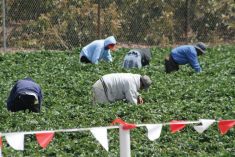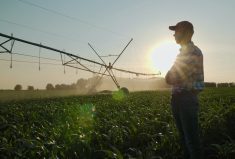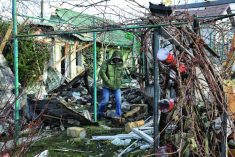Rural Albertans could be on the hook for a growing number of orphaned and abandoned wells and tens of millions in back taxes owed by struggling oil and gas companies.
“This is not the first year we’ve had companies choosing not to pay their taxes, and it is escalating,” said Al Kemmere, president of the Rural Municipalities of Alberta. “We have been taking this on the chin fairly aggressively over the years with bankruptcies and writing taxes off of our profit sheets.”
Read Also

Farming Smarter receives financial boost from Alberta government for potato research
Farming Smarter near Lethbridge got a boost to its research equipment, thanks to the Alberta government’s increase in funding for research associations.
Since 2014, the number of orphaned and abandoned wells has climbed across the province as bankruptcies forced smaller oil and gas companies to shutter their operations. But now, larger companies are following suit, and rural municipalities are left holding the bag, to the tune of $173 million in unpaid taxes — a 114 per cent increase over last spring.
“The scary part of this is that it’s outside municipal jurisdiction but it affects our ratepayers so significantly,” said Kemmere.
“Industry is supposed to look after it, but with the increase in number and the cost, you can start to see that this is going to end up falling on the taxpayers of Alberta to try and rectify this situation.”
Historically, oil and gas companies have put money in a fund through the Orphan Well Association to deal with the occasional bankruptcy. But in recent years, these bankruptcies have become more common as the global price of oil dropped and markets around the world increasingly turn an eye toward renewable energy sources.
“There probably hasn’t been enough money set aside or enough processes in place to deal with the accumulation of orphan wells,” said Kemmere.
These wells also pose environmental and health risks, and one report from conservative think-tank C.D. Howe Institute estimates that the total cost of well abandonment and remediation could be upwards of $8.6 billion.
And farmers are often the ones directly affected by these abandoned wells, Kemmere added.
“I’ve been on enough farmland to see how intrusive a well can be,” he said. “Farmers over the years have been compensated for that inconvenience and that loss of productivity on their lands. But if it just sits there, there’s often not a payment.
“At the same time, we can’t let the oil and gas companies completely off the hook, because they have taken the profits out of this process. They can’t just leave the taxpayers totally responsible for their cleanup.”
‘Money from a stone’
But Alberta Premier Jason Kenney is urging leniency for these struggling oil and gas companies.
“You can’t wring money from a stone,” Kenney said to reporters on Jan. 21. “The best solution, in our view, is to create a future for those companies that are struggling.”
Kenney encouraged municipalities to work with his government “to create the best conditions to turn that economic situation around.”
While municipalities have the legal right to go after companies over unpaid taxes, it might be fruitless, he said.
“For companies that are on the verge of bankruptcy, they have no cash and very little in the way of assets. There’s not a lot to go after.”
But taxpayers can’t continue to carry that burden, said Kemmere.
“We want to come up with a solution,” he said. “What that looks like right now, I don’t know, but hopefully we can come out of this with something that allows them to exist but at the same time does not put the viability of municipalities at risk either.”
Officials from his association will be meeting with government over the next month to talk about some possible solutions, including a process where wells that are orphaned but still productive can be worked to pay for the orphan costs of other wells.
“If it’s still a reasonably productive well, we need to make sure we don’t lose that investment,” said Kemmere.
This would be another way to get people back to work in Alberta, he added.
“There are a lot of people in the industry who have got the tools needed to look after this, and that could be a great win-win-win situation.”
Kemmere is also calling on the province to “tighten up” its regulations to ensure that oil and gas companies — and not rural taxpayers — are responsible for the cost of these wells and unpaid municipal taxes.
“We need to talk with both the provincial and federal government to see if there are ways we can get them to try and take up some of this load,” said Kemmere. “But when it comes to the orphan well situation, we’re hoping that something will be done, because it is a safety issue and potentially an environmental issue.
“It cannot be forgotten, and we need to come up with solutions to ensure that.”















